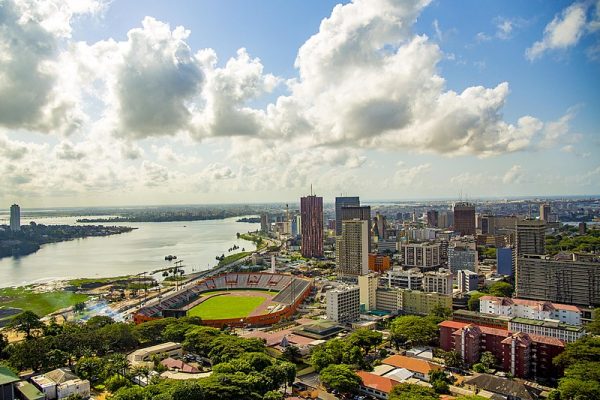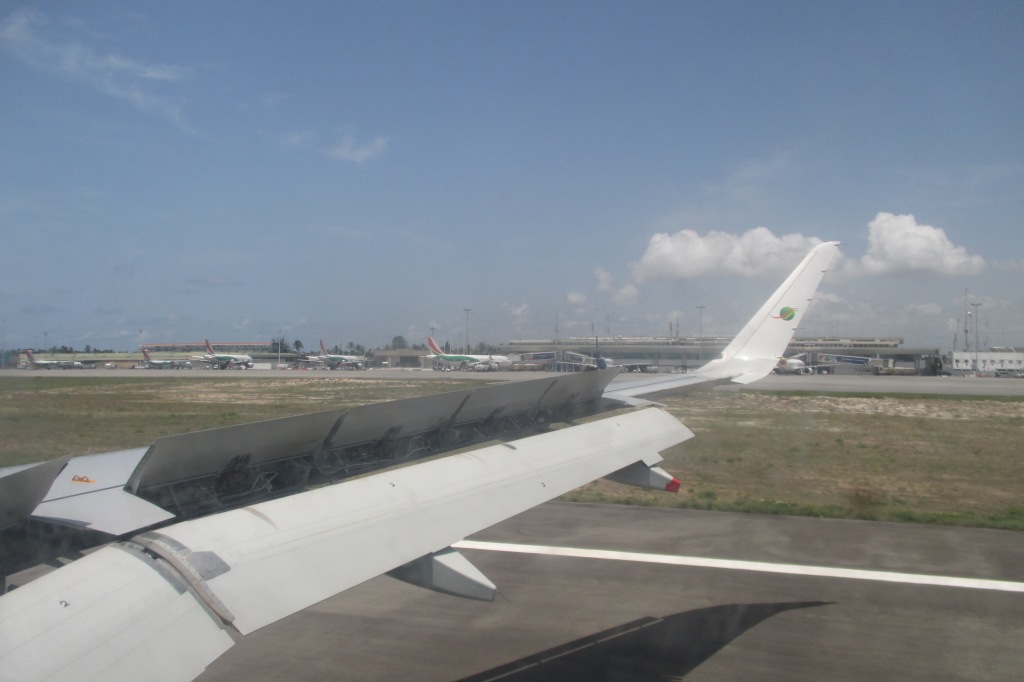
More contacts with more agencies yielded nothing. Most of them working online have a clientele that can easily afford €1,000 a month as a starter rent and that clientele does not include me.
One of the agencies serving the filthy rich is the one that – incredibly! – I paid my rent to when I lived in Ouagadougou. I recognised the logo – AICI. I had no idea that I was paying an agency that had once been run by…Côte d’Ivoire’s First Lady and now by one of her close friends, who also runs the country’s annual Who’s In – Who’s Out event, the Children of African Gala Dinner. We just had the latest edition in the glitzy Sofitel Hotel Ivoire, early March. (I wonder if one of the members of the namedropping family I described earlier showed up there…) Anyway, little surprise, then, that AICI (with branches in Abidjan, Paris, Ouagadougou, Yamoussoukro and Cannes, that hotbed of the Moneyed, the Great and the Good) rents apartments starting at three million francs…that’s €4,600. Per month. In Abidjan. Obviously, AICI would not get away with charging these outrageous amounts in much (much!) cheaper Ouagadougou… But this is just to give you some idea of the insane yawning gap between the rich and the poor.
On we go and I promise you we’re nearing the end.
Another restaurant staff member told me her brother works for…another housing agency. Before I could think “here we go again” I made a decision to go and see him. I got his number and we agreed to meet in front of Café Versailles, Ivorian reggae star Alpha Blondy’s old place. I don’t think he’s got anything to do with it any longer, which may account for the atrocious American autotuned r&b dross the place vomited out as I was arriving. It was hot and they were late (I assumed, correctly, that brother in question would not come by himself).
Eventually, they arrived, on two motorbikes. Hopefully this was not going to be yet another installment of ‘Hello We’re From the Kingdom of Vagueness and our Job is Showing Up…’ But no. My new contact was indeed the restaurant staff member’s brother and the other man was his colleague. Off we went to see the place, which they were in the process of readying for the next locataire.

Apparently, the process of getting the place ready involved leaving a godawful mess for said next locataire to clean up. That could be me: I walked around, liked what I saw (one smallish room, one slightly larger, one salon with space to play with, two toilets, balcony with a nice view, kitchen) and thought: this, I think, will do for now. It’s the top floor of a nice, solid looking older building and the view is towards Le Plateau and its behemoth government tower, a landmark mosque and my beloved Deux Plateaux. At €381 a month I’d be reasonably safe financially.
So this is it, then. I could finally get back to the hotel, bring my accumulated wad of cash and take it to the office of the agency managing the building. But the two gentlemen insisted that they’d take me to the office themselves, for the paperwork. This turned out to be a mere five minute ride but my biker mate got stuck in a rut while trying to cross a busy road (yes, another one) and was so unstable that I declined any future lifts. Walking is a lot safer, thank you. Incidentally, both men ended up demanding Showing Up Money after all, so that’s where the Right To Visit Fee I thought I had kept in my pockets for once eventually went… I did tell the gentlemen that I expected them to remove their piles of wood chippings, wooden low chair, plastic bottles, plastic bags, empty paint jars, rags and assorted other crap that has nothing whatsoever to do with me. I’ll get rid of the paint and the dust and grime on the floor, no worries – I ran my own places and kept them clean for decades.
Now that I knew where the agency was (a ten-minute walk, tops, from what was now going to be MY apartment, yay!!!) I could easily wander back to the hotel, a mere 40-minutes away on foot, along the boulevard Latrille, into the Rue des Jardins, as I cleared my head. All I had to do was come back with two month’s rent, two month’s caution and admin costs. This looked like a small but bona fide family business. The genial owner invited me into his office for a chat, just to get to know his new tenant. Journalist, hey…. His daughter is doing the admin and lives next door to the apartment complex, so if anything were the matter all I have to do is call her.

In short, I have a place, a contract, this desk I am working at right now, one very recently acquired table and four chairs, a mattress, water, electricity, Orange Money with which to pay the water and the electricity, and that balcony. Not bad for an all-too-frequently penniless hack… Highest urgency – something to make decent coffee with.
One drawback I have already spotted: the concierge. This role is taken by two lovely young fellows but both of them go to sleep at the impossible hour of 10-11pm, while this whole area is filled to the brim with watering holes, eateries and maquis offering food from here, Lebanon, Congo, Cameroon, China, Italy, Vietnam, France… There’s also a very French sounding coffee place that never closes… As many of you know my time to come alive is at night. Having said that, I have made it a point to be in before midnight at the latest – but even at that early hour our concierge will already be sleeping. I find this…slightly awkward. This is a family complex; people go to bed early. Should I just go: sod it – if I feel like coming in at 2am I should just bloody well do it…? That would be rude, would it not? A slight dilemma, which a future fridge will partially solve, if and when the means to acquire such arrive.
Speaking of awkward. As I was checking out of my hotel, the staff member whose brother finally got me this place wanted to know whether I was going to hire her for cooking and cleaning. I had to tell her that there was really no need. I will eat outdoors for the time being (prices being ridiculously cheap if you know where to look) and I do my own cleaning. She wasn’t too disappointed – I hope. Oh and the brother in question accosted me recently in a nearby street as I was minding my own business, breezily telling me that his cousin had just died in Yopougon… I cut him off before he could ask me for the taxi fare. I am out of your clutches, gentlemen and some ladies from the Kingdom of Vagueness. With or without an office. Or cousins. Or a daughter to marry off. Or Right To Visit Fees. Or any of the gazillion other schemes and cock-and-bull stories you have in your inexhaustible repertoire. Au revoir (peut-être)!






















